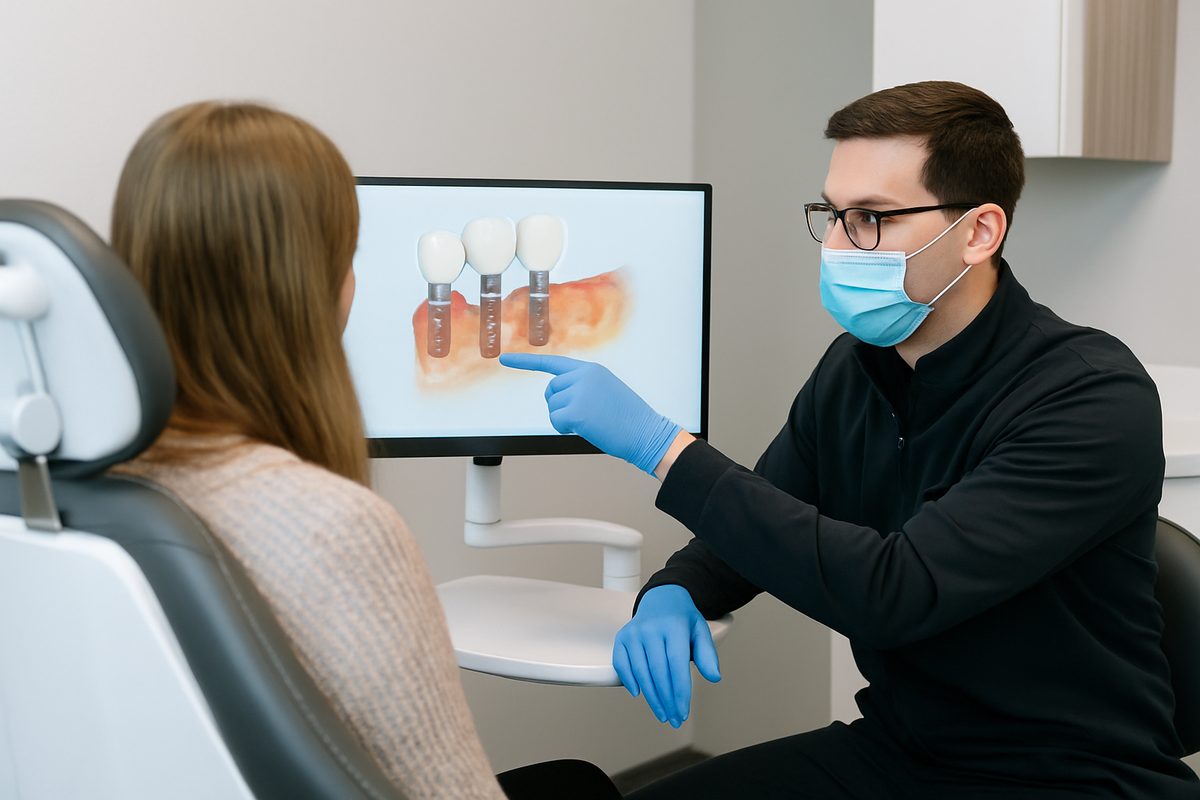Blog - Fort Wayne, IN
Tips, Facts, And The
Latest In Dentistry

Your Guide To Dental Implants In New Haven, Indiana

Dental implants can restore your smile, chewing, and confidence. This guide covers what dental implants are, who’s a good candidate, treatment options, costs, risks, and how to choose care for dental implants new haven in. Read through to learn next steps and what to ask at a consultation.
What Are Dental Implants?
A dental implant is an artificial tooth root—usually a titanium post—placed into the jaw to hold a replacement tooth (crown), bridge, or denture. The implant post is topped with an abutment that connects to a crown. Unlike bridges or removable dentures, implants replace the tooth root and fuse with bone through osseointegration. That root replacement gives implants more stability and preserves jawbone over time compared with traditional dentures.
Key Benefits Of Dental Implants For Patients In New Haven, IN
Dental implants offer long-term durability, improved chewing, clearer speech, and a natural look. Because they replace roots, they slow bone loss that follows tooth loss. For example, a patient who struggled with slipping dentures found that single-tooth implants let them eat apples and speak confidently again. Implants also protect adjacent natural teeth because they don’t require grinding down neighbors like a traditional bridge.
Who Is A Good Candidate For Dental Implants Near New Haven, IN?
Oral health factors
Good candidates typically have healthy gums and adequate jawbone to support the implant. If tooth infection, decay, or periodontal disease exist, those must be treated first. Patients with bone loss may need a bone graft before implant placement. Your implant dentist will use exams and 3D imaging to check bone volume and gum health before planning treatment.
Medical & lifestyle considerations
Controlled medical conditions like diabetes usually don’t rule out implants but require careful planning. Smoking reduces healing and raises failure risk; quitting improves outcomes. Certain medications (e.g., some osteoporosis drugs) and heavy alcohol use can affect candidacy. Age alone is not a barrier—many older adults successfully receive implants if overall health and oral conditions allow.
Types Of Dental Implant Treatments
Single-tooth implants
A single implant and crown replace one missing tooth. This is ideal when neighboring teeth are healthy and you want a long-term, natural-looking solution that doesn’t affect other teeth.
Multiple implants and implant-supported bridges
When several adjacent teeth are missing, two or more implants can support a bridge without needing to alter healthy teeth. This restores function and appearance while preserving nearby tooth structure.
Full-arch solutions (All-on-4 / implant-retained dentures)
For most or all teeth missing, full-arch restorations like All-on-4 or implant-retained dentures provide a fixed or removable prosthetic supported by implants. These options restore chewing power and are often faster and more stable than traditional dentures.
The Dental Implant Process Near New Haven, IN
The typical implant journey starts with a consultation and oral exam, including 3D imaging and treatment planning. Next is implant placement—often an outpatient procedure—and then a healing period for osseointegration (usually 3–6 months). After healing, an abutment and final crown, bridge, or denture are attached. Some systems offer immediate temporary teeth, but timelines vary by case complexity and whether bone grafting is needed.
Possible Risks, Complications, And How They’re Managed
Short-term issues can include swelling, bruising, minor bleeding, or infection—usually managed with medication and follow-up. Long-term risks include implant failure from poor integration or overload, and peri-implantitis (gum inflammation around an implant). Careful planning, proper surgical technique, and regular maintenance lower risks. Seek dental care for persistent pain, swelling, loosening, or drainage.
Costs, Insurance & Financing For Dental Implants New Haven, IN
Costs vary widely: single implants with crown often range from moderate to several thousand dollars per tooth. Factors include number of implants, need for extractions or grafts, type of restoration, and lab work. Some dental insurance may cover parts of the restoration or diagnostics but rarely covers the full implant cost. Common financing options include in-office plans, third-party medical/dental financing, and payment plans. Discuss clear cost estimates and financing at your consultation.
Advanced Technology & Treatment Options Near New Haven, IN
Advanced tools improve precision and outcomes. Guided implant surgery uses digital planning to place implants more accurately. Yomi robotic-assisted placement offers real-time feedback to align implants precisely. On-site dental labs speed turnaround and allow customization of crowns and bridges for better fit and aesthetics. Ask whether your provider uses modern imaging, guided tools, or in-house lab work.
How To Choose An Implant Dentist Near New Haven, IN
Look for training and experience placing implants, patient reviews, clear treatment plans, transparent pricing, and modern technology. Ask questions such as: How many implants do you place yearly? Do you perform bone grafts and sinus lifts? Will you use guided or robotic placement? What is the expected timeline and total cost? How will follow-up and maintenance be handled?
Looking For Dental Implants Near New Haven, IN?
Sycamore Hills Dentistry, based in Fort Wayne and serving patients near New Haven, offers advanced implant care including Yomi robotic surgery and an on-site dental lab for faster restorations. The practice provides evening appointments, family block scheduling, and financing through Insurance & Financing to help make treatment accessible. If you’re exploring dental implants new haven in, request a consultation or a second opinion to review options, costs, and a personalized treatment plan.




